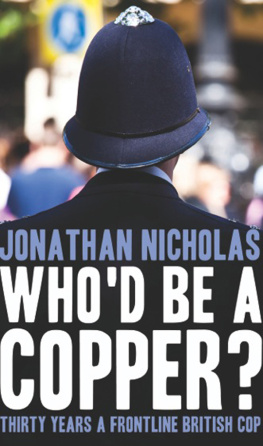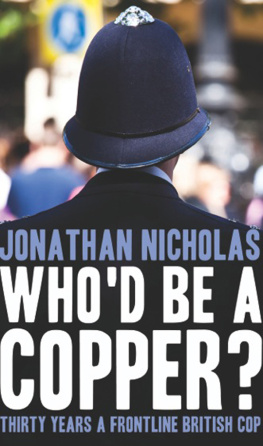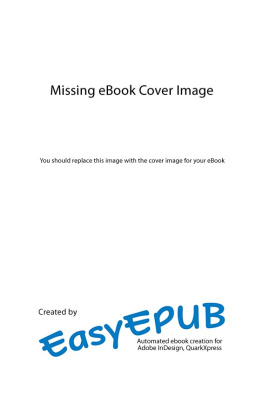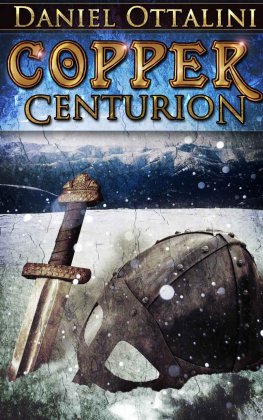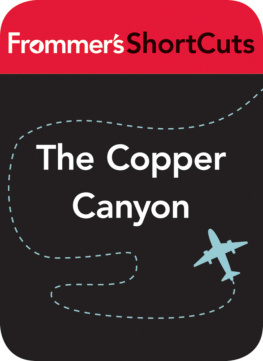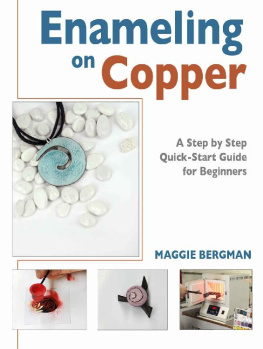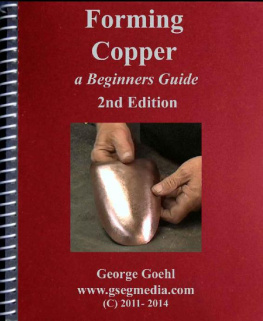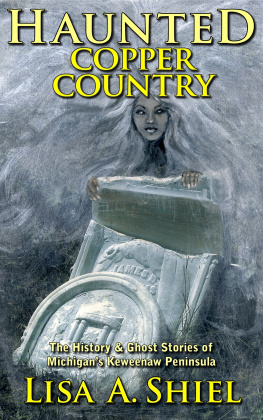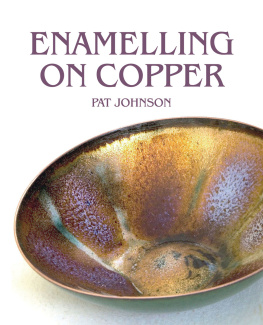Jonathan Nicholas - Whod Be a Copper?
Here you can read online Jonathan Nicholas - Whod Be a Copper? full text of the book (entire story) in english for free. Download pdf and epub, get meaning, cover and reviews about this ebook. year: 2015, publisher: Troubador Publishing, genre: Non-fiction. Description of the work, (preface) as well as reviews are available. Best literature library LitArk.com created for fans of good reading and offers a wide selection of genres:
Romance novel
Science fiction
Adventure
Detective
Science
History
Home and family
Prose
Art
Politics
Computer
Non-fiction
Religion
Business
Children
Humor
Choose a favorite category and find really read worthwhile books. Enjoy immersion in the world of imagination, feel the emotions of the characters or learn something new for yourself, make an fascinating discovery.
- Book:Whod Be a Copper?
- Author:
- Publisher:Troubador Publishing
- Genre:
- Year:2015
- Rating:5 / 5
- Favourites:Add to favourites
- Your mark:
- 100
- 1
- 2
- 3
- 4
- 5
Whod Be a Copper?: summary, description and annotation
We offer to read an annotation, description, summary or preface (depends on what the author of the book "Whod Be a Copper?" wrote himself). If you haven't found the necessary information about the book — write in the comments, we will try to find it.
Whod Be a Copper? — read online for free the complete book (whole text) full work
Below is the text of the book, divided by pages. System saving the place of the last page read, allows you to conveniently read the book "Whod Be a Copper?" online for free, without having to search again every time where you left off. Put a bookmark, and you can go to the page where you finished reading at any time.
Font size:
Interval:
Bookmark:
Also by Jonathan Nicholas:
Hospital Beat
Kibbutz Virgin
The Tragic Romance of Africa
Oz A Hitchhikers Australian Anthology

Copyright 2015 Jonathan Nicholas
The moral right of the author has been asserted.
Apart from any fair dealing for the purposes of research or private study, or criticism or review, as permitted under the Copyright, Designs and Patents Act 1988, this publication may only be reproduced, stored or transmitted, in any form or by any means, with the prior permission in writing of the publishers, or in the case of reprographic reproduction in accordance with the terms of licences issued by the Copyright Licensing Agency. Enquiries concerning reproduction outside those terms should be sent to the publishers.
Matador
9 Priory Business Park
Kibworth Beauchamp
Leicestershire LE8 0RX, UK
Tel: (+44) 116 279 2299
Fax: (+44) 116 279 2277
Email:
Web: www.troubador.co.uk/matador
ISBN 978 1784628 963
British Library Cataloguing in Publication Data.
A catalogue record for this book is available from the British Library.
Matador is an imprint of Troubador Publishing Ltd
To my wife, Alyson
For tolerating me.
This is a true story
Some names and identities have been changed, omitted, or disguised for legal reasons and in order to protect privacy. Otherwise, it all happened exactly as described.
How many fingers, Winston?
Four! Stop it, stop it! How can you go on? Four! Four!
How many fingers, Winston?
Five! Five! Five!
No, Winston, that is no use. You are lying. You still think there are four. How many fingers, please?
Four! Five! Four! Anything you like. Only stop it, stop the pain!
From George Orwells
Nineteen Eighty-Four
I recently completed thirty years as a constable in the British police. I had a very interesting time as you might expect and saw everything from petty theft to gruesome murders. But it wasnt all about crime; in fact a huge amount of time was taken up with social work, and still is today. When I joined the job as it is known, it seemed the police were barely accountable to anyone. Some prisoners were often left hand-cuffed to radiators in corridors of police stations all weekend and even then when released theyd say Thank you as they left. This worked pretty well in summer but in winter those old radiators were bloody hot, and the poor unfortunate scallywag would often admit anything after being partially cooked for seventy-two hours.
I worked the front line wearing a uniform in an inner city area for all of those thirty years. Not ten years, or twenty years, but three long decades. It wasnt some sleepy rural backwater either, but one of the most challenging areas of England, in a city with one of the highest crime rates in the UK. Like many British cities Nottingham has become known as a multi-cultural city. But what does this really mean? How much do you really know about the Sikh way of life, the Jews living down your street, or the Muslim family who run your corner shop?
The closest thing to rural policing I ever experienced was The Forest, an incongruous bit of flat grassy area with a slope on one side in the middle of Nottingham where they usually accommodate the annual Goose Fair. There hasnt been any poaching or cattle rustling, but there have been plenty of occasions when people wandered around with illegal firearms.
I started as a foot beat officer, as everyone did in those days, in February 1984. The miners dispute began just after this and I suddenly felt as though Id been drafted into the army. In fact during the dispute we were often referred to as troops by senior officers, which led the media to suspect that soldiers had been employed to assist in the eventual breaking of the strike. The greatest memories I have of the dispute, apart from filling in all the lucrative overtime forms, is of being continually shouted at and verbally abused all day, every day, and that was just by my colleagues. The seemingly endless boredom was occasionally punctuated by some very bland packed lunches in flimsy white cardboard boxes, the best parts of which were an apple and a Mars bar. The very long days were usually spent with a dozen other hairy-arsed coppers crammed inside a Ford Transit van inevitably exposed to copious amounts of disgusting belching and farting. There didnt seem to be any lady cops working the dispute, maybe because most ladies clearly didnt possess the necessary hairy bottoms.
After a couple of years walking the beat and almost losing my job for never actually prosecuting anyone, I was sent on a driving course. I then spent the next ten years driving response cars around the city. Working as a response officer means you are usually the first on the scene at almost everything that comes in, day and night, and frequently alone. For me, and for most cops, it is a very rapid apprenticeship. I was told: If you can do the job here, you can do it anywhere. It was certainly never boring.
In those days we didnt have any sirens in the police cars; I think they were deemed to be too American. As a consequence I frequently drove a small Ford Escort at 80 mph on the wrong side of the road in built up areas in a ridiculously dangerous manner, taking both hands off the steering wheel in order to alternately press the horn, change gear, and flash the headlights, while screaming at people to get out of the way. Steering with your knees at high speed while dodging startled pedestrians is not ideal, but this was expected. Such things were done in order to make the job work, bending the rules to varying degrees for the sake of expediency. One of my first sergeants told me, If you have to break the rules, dont worry, youre acting in the interests of justice.
It was known that at least unofficially you were supported and backed all the way. This and other things we did as calculated risks so the job was done as quickly as possible. Today things are very different.
I was enjoying my job and it was very exciting. I was a young man tearing around the city every day in a police car. I worked extremely hard for a long time and I didnt look up until I had a dozen years service. When I looked around I realised just what an idiot Id been for being so conscientious. Other cops were getting paid the same as me or more and were actually getting away with half the work. Some thoroughly bone idle colleagues also ended up acquiring quite high rank in the police service, so you clearly didnt always need to work hard to be promoted. It seemed that passing an exam and some impressive use of management clichs in interviews was all it took for some people. Youd see them every few years when you visited headquarters, but they would be another rank higher than when you last saw them, careerist cops whod never worked shifts or undertaken any proper police work. When youve been in the job long enough you know the true nature of quite a few high ranking officers, and you remember clearly just how idle they were when they were constables.
It was not in my nature to expend endless amounts of energy avoiding work. This was how I saw it; it was quicker and easier to volunteer and just get the job done than otherwise. Not only this, a good reputation as a hard working officer would stand me in good stead, or so I thought. This nave idea was to be proved wrong much later in my service when I had some very hurtful wrangles with the PSD, the Professional Standards Department. If you can imagine a huge and rapidly expanding department within any organisation whose main raison detre seems to be to unnecessarily persecute all hard working conscientious cops then this is the modern day PSD. Its the same in every UK police force nowadays. They are a bastard cross between the Soviet Stasi and the German Gestapo, but thankfully nowhere near as well-organised, professional or efficient. They seem to exist only to further their own ends, to create a climate of fear in the workplace, and to counter their own extreme paranoia. They usually operate in pairs and luckily many of them conduct themselves more like Bungle and Zippy from the childrens TV show
Next pageFont size:
Interval:
Bookmark:
Similar books «Whod Be a Copper?»
Look at similar books to Whod Be a Copper?. We have selected literature similar in name and meaning in the hope of providing readers with more options to find new, interesting, not yet read works.
Discussion, reviews of the book Whod Be a Copper? and just readers' own opinions. Leave your comments, write what you think about the work, its meaning or the main characters. Specify what exactly you liked and what you didn't like, and why you think so.

